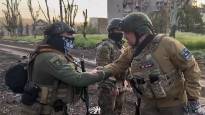MOSCOW After all, a businessman Yevgeny Prigozhin chose a “deal” over military glory.
It is not strange in itself that Prigozhin backed down. He had an estimated 25,000 fighters at his disposal, of which, according to unconfirmed information from the Reuters news agency, 5,000 were rushing towards Moscow.
Such a force will not yet take over the capital of Russia.
On the other hand, for the Kremlin, the battles at the gates of Moscow would also have been unpleasant: they would have crumbled the last shreds of the image of stability with which the president Vladimir Putin administration was once sold to citizens.
Therefore, the President of Belarus Alexander Lukashenko the agreement offered was a compromise acceptable to the parties.
Prigozhin seems, at least at this point, to get out of the dangerous game alive and into the shelters of Belarus. The Kremlin did not have to test the violence machinery of internal security against battle-hardened mercenaries.
It has not been said that the National Guard and the police would have done as well in the situation as they did against unarmed protesters.
What the Wagner fighters got for their trouble is unclear. According to the Kremlin, no charges will be brought against them, and some of them may sign a contract with the Ministry of Defense.
Putin’s old opponent, former oligarch Mikhail Khodorkovsky already had time on Saturday on Twitter urges anti-war Russians to support Prigozhin in his rebellion.
Known for his brutal language and shady war business, Prigozhin seems like a strange figure to be a champion of democracy. It is of course understandable that in Russia’s tight-lipped opposition circles there is hope for cracks in Putin’s system.
It seems that Prigozhin did not want to be overthrown not President Putin but the old elite around him. At no point did Prigožin’s project look like a traditional coup.
Successful coups are usually carried out by the official armed forces, whereas in this case a private army was at work, which was not even stationed at the heart of power, in the country’s capital.
Rather, Prigozh seemed to be still offering his services to the president.
In his video speech on Friday, Prigozhin presented Putin with the possibility of a way out of the quagmire of the war against Ukraine: the minister of defense could be named as the scapegoat for the unfortunate war Sergei Shoigu and Chief of the General Staff Valery Gerasimov and oligarchs who coveted Ukrainian property.
Putin could wash his hands of them – and Yevgeny Prigozhin could take their place in the power system.
Opposing the corrupt elite has been at the core of Prigozhin’s rhetoric, appearing as an outspoken man of the people.
It has appealed to strongly nationalist circles in Russia, who would like to see an internal cleansing of the nation in addition to a victorious war.
Putin’s speech yesterday made it clearthat the Russian president was not ready to yield to Prigozhin’s demands.
Probably, Prigozhin realized that his gamble would not bring results, and therefore took the way out offered by the leader of Belarus.
There is speculation that Šoigu and Gerasimov would indeed lose their posts as part of the deal made by Prigozhin.
It still seems unlikely. Rather, Putin may now have an even stronger need to keep them in office, so that he does not appear to have given up on this matter as well.
The crisis does not paint a good picture On the stability of Putin’s system. The head of the private army defied the vertical of power built by Putin and managed to momentarily upset the entire power apparatus.
In the end, he still gets out of the situation alive, even while the citizens of Rostov are cheering in the streets.
For the Russian armed forces, the confrontation was not free. Pro-war nationalist Telegram channels have calculated that Wagner forces shot down at least one plane and 3-6 helicopters. As many as 13–15 soldiers are said to have died.
The relationship between soldiers and mercenaries can therefore be very tense after the rebellion.
It seems that the citizens’ trust in the Putin administration’s ability to defend the capital from the Wagnerites was not unshakable either.
Air tickets from Moscow became more expensive, and tickets to many popular destinations were sold out, Kommersant newspaper told.
There were speculations on social media that the Russian government had also left the city. Representative of the President Dmitry Peskov had to assure that Putin works normally in Moscow.
The United States is now tellingthat it had intelligence about Prigozhin’s intentions when he was gathering his forces for the uprising.
It raises the question of how Putin’s extensive security apparatus was caught by surprise – or whether part of the security apparatus was directly on Prigozhin’s side.
There’s a lot we don’t know, and that usually leads to conspiracy speculation.
Was the whole uprising just a show built by the Putin regime to achieve some secret goals? It would seem unbelievable, because the situation only made the administration look helpless.
Prigozhin’s show could even leave a dangerous impression that an armed rebellion could succeed.
Relying on a private army in the war was in itself a sign of weakness: Russia’s mighty official armed forces are not able to survive their war in Ukraine by themselves, even though their reform had been presented to the citizens as a major achievement of the Putin regime.
